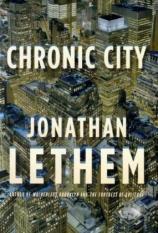Chronic City
Review
Chronic City
You may have encountered Perkus Tooth, the scruffy, oh-so-New-York 1970s saurian “employee” of the Criterion Collection before in THE BOOK OF OTHER PEOPLE, a collection of character sketches edited by Zadie Smith. In that sketch, we met Perkus through the wide eyes of a narrator practically infatuated by his peculiarity. We see that he’s a peculiar character, a relic of a bohemianism now more fetishized than believed in, and that the narrator very much wants to be part of his life, but that’s about it.
CHRONIC CITY gives a fuller introduction to Perkus and the forces that draw our narrator, Chase Insteadman, to him. Chase is a child actor, now wealthy, whose only current claim to fame is his supposed romantic devotion to Janice Trumbull, an astronaut trapped on a space station (presumably indefinitely due to some medical condition). Chase seems to have more time and money than he knows what to do with, and, having little actual devotion to his beloved, he spends his time making sweeping (though often quite gorgeous) pronouncements about himself and the world around him. Take, for example, the following: “I have trouble believing anything exists until I know it bodily.” For all the pretension in it, there’s earnestness to Perkus’s speech that undercuts the lazy bohemian fog around him, making his attraction to Perkus all the more imperative to his life.
Chase discovers Perkus on a visit to the Criterion Collection office regarding a film he worked on. Perkus only wears suits. He looks 70, but is actually much younger. During the 1970s, he was a major bohemian figure, an underground conceptualist artist who ranted around town on construction sites, inspiring followings in New York’s art and grad school alt-intelligentsia. Forty years later, he has not left the ’70s and barely manages to eek out a living, never leaving his apartment except to eat greasy cheeseburgers. Chase is drawn to Perkus in something bordering on obsession. Forgive me if I quote at length, but Lethem’s best passages are golden soliloquies:
I wanted this selfishly, for, it dawned on me then, Perkus Tooth --- his talk, his apartment, the space that had opened beginning when I’d run into him at Criterion, then called him on the telephone --- was my ellipsis. It might not be inborn in me, but I’d discovered it nonetheless in him. Where Perkus took me, in his ranting, his enthusiasms, in his abrupt, improbable asides, was the world inside the world. I didn’t want him smothered in the tomb-world of migraine. Perkus was the opposite of my distant astronaut fiancée --- my caring for him could matter on a daily basis.
Chase and Perkus suffer from a longing they can’t quite identify. Much of the novel is devoted to Chase’s mostly misguided attempts to fulfill those ineffable desires. But the plot isn’t what shines here; Chase and Perkus, as engaging characters as they may be, aren’t the most interesting feature here. That honor is reserved for the setting itself as Lethem’s narration is in many ways one giant poem to Manhattan. The city is a fractal of endless original complexity, spoken with a sense of awe and reverence usually reserved for the ancient, catacomb-like city of London. Again, apologies for the quote at length, but Lethem can turn quite a phrase:
To live in Manhattan is to be persistently amazed at the worlds squirreled inside one another, the chaotic intricacy with which realms interleave, like those lines of television cable and fresh water and steam heat and outgoing sewage and telephone wire and whatever else which cohabit the same intestinal holes that pavement-demolishing workmen periodically wrench open to the daylight and to our passing, disturbed glances. We only pretend to live on something as orderly as a grid.
The city stars as a landscape, a prison, a playpen, a realm of dashed dreams, and a psychedelic vision. It’s a microcosm of human existence and a bizarre exception to all normal rules of life. If all this sounds like excessive aggrandizing, note that Lethem familiarizes readers well. Natives and never-beens alike will gain an insight into Lethem’s passionate, peculiar rendering of this ever-enigmatic city and the people who live in it.
Reviewed by Max Falkowitz on December 27, 2010
Chronic City
- Publication Date: October 13, 2009
- Genres: Fiction
- Hardcover: 480 pages
- Publisher: Doubleday
- ISBN-10: 0385518633
- ISBN-13: 9780385518635




